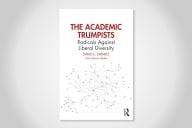You have /5 articles left.
Sign up for a free account or log in.

Karolina Grabowska/Pexels.com
The City University of New York waives out-of-state tuition fees for funded first-year graduate students. By their second year, having already spent 12 months or more in New York State, these students qualify as residents on their own.
The pandemic threw that typical timeline off course, however, as many graduate students didn’t or couldn’t move to New York last summer. And there was little incentive to uproot then, as CUNY’s Graduate Center remained online for the fall and spring terms. Departments also reassured out-of-state students that they would still qualify for in-state tuition when they eventually arrived.
These students are in New York now, ready to begin their second year of study. But they’re facing thousands of dollars in out-of-state tuition fees -- the ones they were told not to worry about.
Kaci Harrison, a second-year Ph.D. student in philosophy, for example, last week saw $2,755 withheld from her pay for the two courses she’s taking this term. Considering her stipend is $26,000 per year, seeing more than 10 percent withheld up front puts her future in the program in doubt.
“I feel like I'm living off of my savings to have a budget I can handle,” said Harrison, who spent last year in Memphis, Tenn., with her partner. “And I’m just not in a position that I can take out more loans to pay for the Ph.D.”
If CUNY doesn’t resolve the issue, Harrison said, “My options are to leave. Incidentally, this was my top-choice program, so I’m in a situation where I really don’t want that to happen.”
Like many institutions, CUNY offers different students different levels of funding. So while Harrison and other students have seen money withheld, others are facing big bills.
Leanne Fan, a second-year Ph.D. student in sociology whose funding package included tuition and what turned out to be a one-time $5,000 living stipend, now owes CUNY $3,900 for the courses she’s taking this semester. She doesn’t plan on paying that, as she’s barely able to afford the room she’s renting from a friend, she said. But she imagines that CUNY will withhold funds from the digital fellowship she applied for on her own, once that $18,000 kicks in.
“I can’t plan anything,” said Fan, who spent much of last year in California helping her mother through a medical issue. “It’s ironic that this financial burden is making it harder for me to commit to living in New York.”
Again, departments told students not to worry about their second-year residency status. Harrison has emails from before last summer saying as much. But by spring of this year, through their union, graduate students heard rumblings of trouble. So they began asking the university to formally declare them residents for their second year.
A petition to that effect, written in May, gathered hundreds of signatures.
When students heard little back, they continued to hold organizing meetings and planned a day of action, mainly on social media, in July. They also attempted to deliver their petition, in letter form, to CUNY Chancellor Félix Matos Rodríguez in person. Still, they got no formal assurances.
This month, the bills came.
Harrison said, “One of the reasons I’m so frustrated is that I’ve been anticipating this for a year. I was like, ‘This is going to end up being a battle,’ and I’m just devastated that it is.”
Fan estimates that 60 to 70 students have been affected, based on who is showing up to organizing meetings. But there could be other students who haven’t yet realized they’re on the hook for out-of-state tuition, she said.
A spokesperson for the university said CUNY is working with the Graduate Center to “quickly resolve this situation.”
CUNY’s faculty union, the Professional Staff Congress, has been advocating for the graduate students, who are union members, as well. Harry Blain, vice chair of the CUNY Graduate Center chapter, said that “students are being punished for doing precisely what they were told to do. Travel during a pandemic -- especially before the emergence of vaccines -- was discouraged by CUNY, the Centers for Disease Control and Prevention, and all public health experts.”
After receiving many millions from the federal government in pandemic-related stimulus funds, Blain said, CUNY has “no excuse to delay any longer.”
To that point, Harrison also compared the university’s silence around the Ph.D. issue to the recent rollout of the CUNY Comeback, a $125 million debt forgiveness program. Whereas the CUNY Comeback targets charges accumulated last year due to the pandemic, she said, it seems that these current changes -- also incurred due to the pandemic -- “need to be part of the conversation.”
Other institutions developed policies ahead of time to prevent this problem. The University of California system, for one, is temporarily allowing remote enrollment to count toward residency.
UC policy, last updated in June, says that eligible students must typically be physically present in California for a year prior to the residency determination date, and an absence of six weeks or more during that period disqualifies them from in-state status. But in response to the pandemic, the policy says, these guidelines were “temporarily amended to allow eligible students entering during the 2020-21 academic year to use remote instruction to stand in for physical presence.”
Eligible UC students who studied remotely last year may therefore be eligible to qualify for residency this academic year, “effective with the term in which they physically reside in California.”
Gwen Chodur, president of the University of California Graduate and Professional Council, said that not all graduate students are funded and that international students pay out-of-state fees until they pass their qualifying exams. But no graduate student has been subject to out-of-state tuition due to the pandemic, in particular, she said.
Harrison, at CUNY, said in the best-case scenario, in which the out-of-state charges are reversed, students have still been harmed. She spent a lot of her summer organizing, she said, instead of getting ahead on her work. Stress is a factor, too.
“It’s goofy,” she said, but “I feel like I’m on a reality TV show just trying not to get eliminated.”









